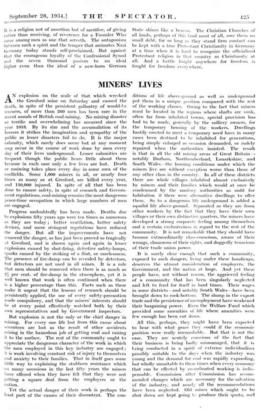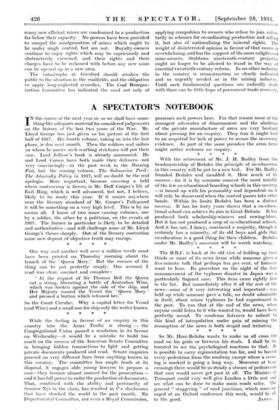MINERS' LIVES
AN explosion on the scale of that which wrecked the Gresford mine on Saturday and caused the death, in spite of the persistent gallantry of would-Le rescuers, of more than 260 men has been rare in the recent annals of British coal-mining. No mining disaster so terrific and overwhelming has occurred since the year 1913. By its size and the accumulation of its horrors it strikes the imagination and sympathy of the public as lesser disasters fail to do. It is the major calamity, which rarely does occur but at any moment nay occur in the course of work done by men every day of their lives underground. Lesser calamities are frequent though the public hears little about them because in each case only a few lives are lost. Death or maiming takes place every day in some area of the coalfields. Some 1,000 miners in all, or nearly four times as many as at Gresford, are killed every year, and 150,000 injured. In spite of all that has been done to ensure safety, in spite of research and Govern- ment regulations, coal-mining remains the most dangerous peace-time occupation in which large numbers of men are engaged.
Progress undoubtedly has been made. Deaths due to explosions fifty years ago were ten times as numerous as they are today ; better ventilation, better safety devices, and more stringent regulations have reduced the danger. But all the improvements have not removed the danger, as has just been proved so tragically at Gresford, and is shown again and again in lesser explosions caused by shot-firing, defective safety-lamps, sparks caused by the striking of a flint, or carelessness. The presence of fire-damp can be revealed by detectors, but detectors are not used in all mines. It is a rule that men should be removed when there is as much as 21 per cent. of fire-damp in the atmosphere, yet it is well known that work is often continued when there is a higher percentage than this. Facts such as these make it urgent that the lessons of research should be persistently applied, the use of every safety-precaution made compulsory, and that the miners' interests should be at every point effectively watched both by their own representatives and by Government inspectors.
But explosion is not the only or the chief danger in mining. For every one life lost from this cause about seventeen are lost as the result of other accidents arising in the hazardous job of getting coal and raising it to the surface. The rest of the community ought to appreciate the dangerous character of the work in which the men employed in this key industry are engaged ; it is work involving constant risk of injury to themselves and anxiety to their families. That in itself goes some little way to explaining the stubborn resistance which on many occasions in the last fifty years the miners have offered when they have felt that they were not getting a square deal from the employers or the nation.
Yet the actual danger of their work is perhaps the least part of the causes of their discontent. The con- ditions of life above-ground as well as underground put them in a unique position compared with the rest of the working classes. Owing to the fact that miners must be located in the regions where shafts are sunk, often far from inhabited towns, special provision has had to be made, generally by the colliery owners, for the temporary housing of the workers. Dwellings hastily erected to meet a temporary need have in many cases been destined to be inhabited for generations, being simply enlarged as occasion demanded, or rudely repaired when the authorities insisted. The result is that in all the old mining areas of Great Britain— notably Durham, Northumberland, Lanarkshire, and South Wales—the housing conditions under which the miners live are without exception worse than those of any other class in the country. In all of these districts there are whole villages inhabited almost exclusively by miners and their families which would at once be condemned by the sanitary authorities as unfit for habitation if there were alternative dwellings to offer them. So to a dangerous life underground is added a squalid life above-ground. Separated as they are from other workers by the fact that they have their own villages or their own distinctive quarters, the miners have developed a strong corporate feeling among themselves and a certain exclusiveness in regard to the rest of the community. It is not remarkable that they should have become. extraordinarily class-conscious, aware of their wrongs, clamorous of their rights, and doggedly tenacious of their trade union power.
It is surely clear enough that such a community, exposed to such dangers, living under these handicaps, deserves the utmost consideration of employers, the Government, and the nation at large. And yet these people have, not without reason, the aggrieved feeling of a community that has been singularly neglected and left to fend for itself in hard times. Their wages in some districts—and notably South Wales—have been brought down to rock-bottom. The slump in the export trade and the persistence of unemployment have weakened their bargaining power. Even the Welfare Fund which provided some amenities of life where amenities were few enough has been cut down.
All this, perhaps, they might have been expected to bear with what grace they could if the economic position were really irremediable. But that is not the case. They are acutely conscious of the fact that their business is being badly mismanaged, that it is being conducted in a spirit of extreme individualism possibly suitable to the days when the industry was young and the demand for coal was rapidly expanding, but wholly unsuitable to these times when every economy that can be effected by co-ordinated working is indis- pensable. Commission after Commission has recom- mended changes which arc necessary for the salvation of the industry, and nearly all the recommendations have been neglected. Old mines which ought to be shut down are kept going to produce their quota, and many new efficient mines are condemned to a production far below their capacity. No powers have been provided to compel the amalgamation of mines which ought to be under single control, but are not. Royalty-owners continue to enjoy rights which may be capriciously and obstructively exercised, and their rights and their charges have to be reckoned with before any new mine can be opened up in a new area.
The catastrophe at Gresford should awaken the public to the situation in the coalfields, and the obligation to apply long-neglected remedies. The Coal Reorgan- ization Committee has indicated the need not only of applying compulsion to owners who refuse to join volun- tarily in schemes for co-ordinating production and selling it, btit also of nationalizing the mineral rights. The weight of disinterested opinion in favour of that course is overwhelming, and has the support of the more enlightened mine-owners. Stubborn nineteenth-century prejudice ought no longer to be allowed to stand in the -way* of essential twentieth-century reform. In no other industry in the country is reconstruction • so clearly indicated and so urgently needed as in the mining industry. Until such fundamental questions are radically dealt with there can be little hope of permanent trade recovery,



















































 Previous page
Previous page